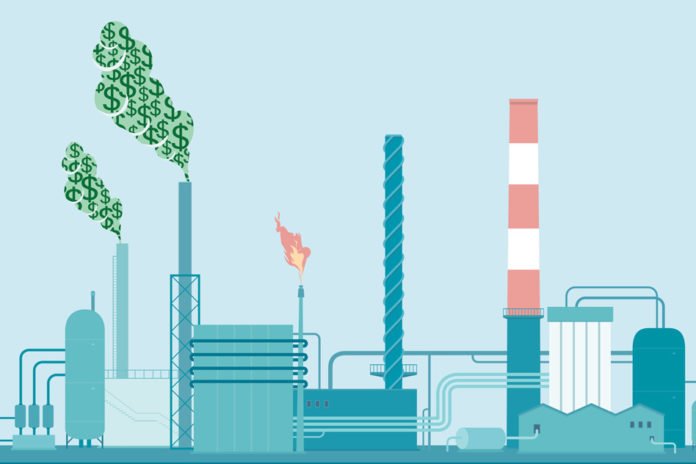Putting a cost on carbon, as a charge or expense on the utilization of petroleum derivatives, combined with restoring the produced income to people in general in some shape, can be a compelling method to check discharges of ozone-harming substances.
That is one of the finishes of a broad examination of a few renditions of such proposition, completed by specialists at MIT and the National Renewable Energy Laboratory (NREL). They found that depending on the exact mechanism chosen, such a tax can also be fair and not hurt low-income households.
The study was a piece of a multigroup push to apply advanced demonstrating instruments to survey the effects of different proposed carbon-valuing plans. Eleven research groups at various foundations completed the examination utilizing a typical arrangement of beginning suspicions and approaches. While huge subtle elements varied, every one of the investigations concurred that carbon duties can be compelling and, if appropriately composed, require not be backward.
Scientists observed several options for a carbon tax and use of the resulting revenue. They considered two different starting values ($25 and $50 per ton of carbon emissions produced), and two different rates of increase (1 percent or 5 percent per year), as well as three different approaches to dispensing the revenue: an equal rebate to every household, a tax break for individuals, or a corporate tax break.
Of the different levels of fees, they found that the most noteworthy beginning quality and the most astounding rate of increment created the best outflows decreases. However, the investigation demonstrated that even the least tax assessment rates could in themselves prompt diminishments adequate to meet the U.S. close term commitment under the 2015 Paris Agreement on environmental change.
An overview report on the 11 studies appears today in the journal Climate Change Economics, along with reports on the individual team results. The MIT and NREL team included former MIT postdoc Justin Caron, MIT Joint Program on the Science and Policy of Global Change Co-Director John Reilly, and Stuart Cohen and Maxwell Brown of NREL.
According to Reilly, the most efficient way of achieving those reductions, in terms of overall impact on the economy, is to use the revenue to reduce taxes on capital — corporate profits or investment income.
Given the moderately high capital taxes in the U.S. (at the time this examination was finished) such cuts goad monetary development more than cuts in different assessments or direct discounts to households. Nonetheless, that choice is additionally the most backward, with its effect disproportionally falling on bring down salary families.
At the other extraordinary, the choice of sending approach installments to everybody was observed to be the minimum efficiency for the general economy, yet in addition the slightest backward. Singular tax cuts came in some place in the middle of on the two criteria.
Scientists used an economic model to assess the impacts of different policies on the world’s likely climate trajectory, and combined that with a model of the nation’s electrical system, developed at NREL. This allows them to do a much more detailed assessment of the way different policies would affect decisions by the power producers and distributors — a key point, since the electricity sector has the most immediate potential for changes that could reduce emissions, and is the biggest contributor to emissions overall.
Scientists found, “While some versions of the carbon-pricing plan were found to be more efficient overall in terms of their impact on the economy, the study found that those impacts are actually quite modest — even without taking into account potential advantages such as better health due to lowered pollution levels.”
“The least-efficient policies still achieved significant emissions reductions, with an overall impact of just four-tenths of a percent on economic growth. For the more efficient options, the same reductions could be achieved at zero cost or even a net gain to the economy.”
The outcomes suggest that starting with a $50 per ton carbon tax and increasing it by 5 percent per year would lead to a 63 percent reduction in total U.S. greenhouse gas emissions by 2050. So that is in accordance with what individuals are discussing, which is requiring a 50 percent diminishment by 2050, internationally and getting to net zero beyond that.
Caron, the paper’s lead author, who was an MIT postdoc during most of this research but is now a professor at HEC business school in Montreal, says that all of the different research teams largely found similar results, though there were differences in the details. “Qualitatively, we all agree on many of the main conclusions.” That includes the fact that carbon taxes can indeed be an effective way to curb emissions.
“By taxing carbon,” Caron says, “we will collect a lot of money that can be used to supplant other taxes that we like less. Why tax something that we like?” And, he adds, by using just a small portion of that revenue — less than 10 percent — it’s possible “to compensate the lower-income people and neutralize the regressivity.”
The actual Paris agreements involved a range of different targets by different nations, but overall, Reilly said, the carbon-pricing scheme is predicted to exceed the targets for emissions reductions for 2030 and 2050, “so that’s a healthy reduction.” But even at the lowest end of the policies they studied, with a $25-per-ton initial tax,” that “would be adequate to meet the U.S. pledge in Paris” for 2030. But the rate of increase is important, the study says: “Five percent a year is sufficient. One percent a year is not.”
Reilly says “all these tax scenarios at worst meet U.S. commitments for 2030, and the $50 tax is well exceeding it.” Many experts say the Paris Agreement alone will not be sufficient to curb catastrophic consequences of global climate change, but this single measure would go a long way toward reducing that impact, Reilly says.
